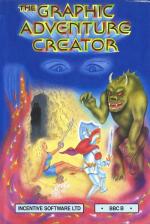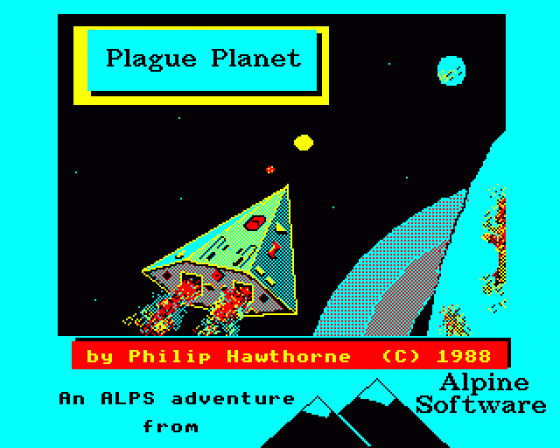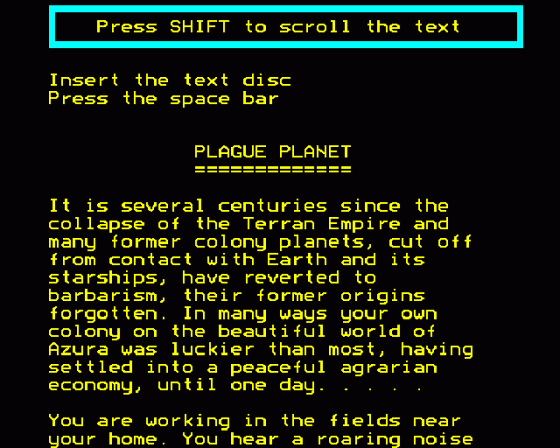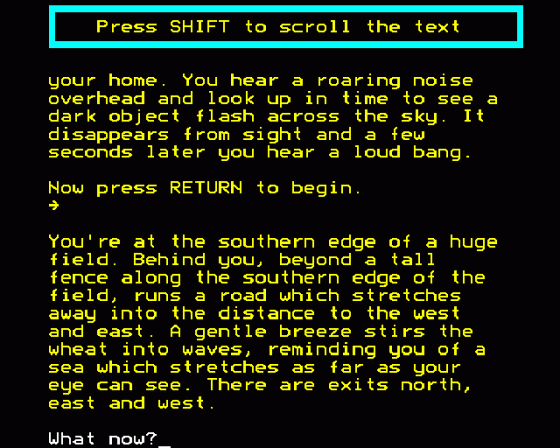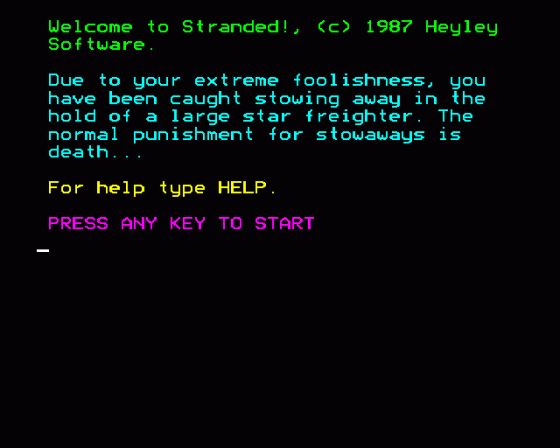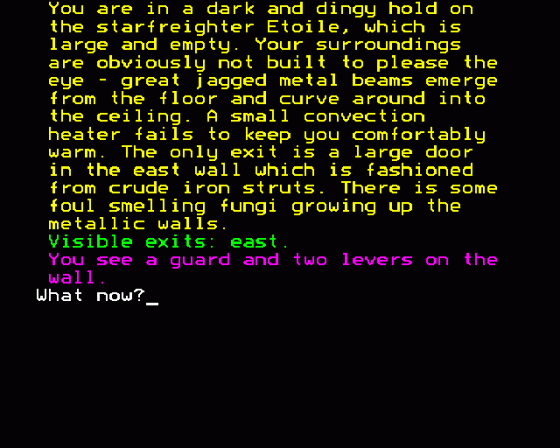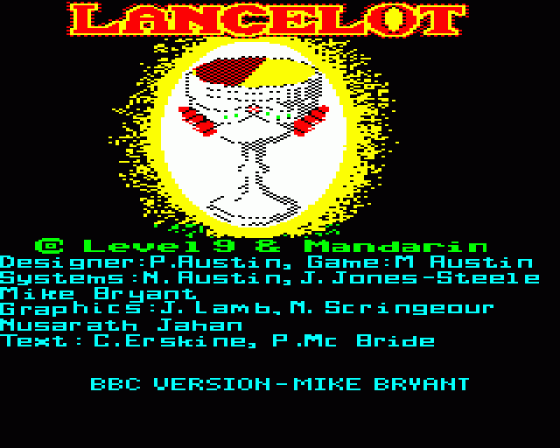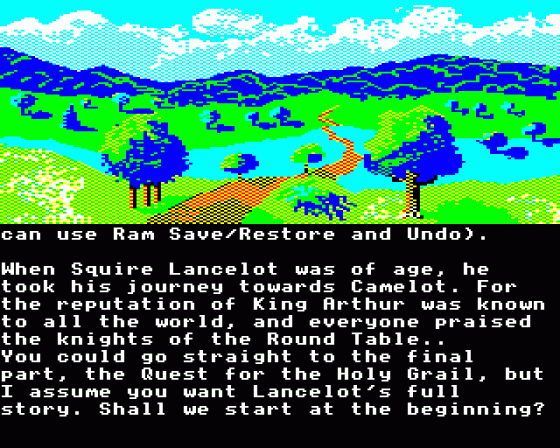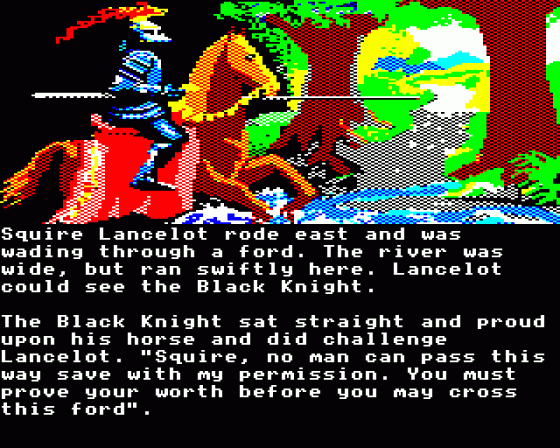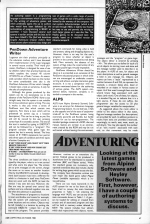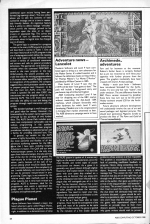
A&B Computing
 1st October 1988
1st October 1988
Categories: Review: Software | News
Author: Jonathan Evans
Published in A&B Computing 5.10
Looking at the latest games from Alpine Software and Heyley Software. First, however, I have a couple of authoring systems to discuss
Adventuring
An authoring system is a programming language or environment which is specialised for the writing of adventure games, and which preferably opens this up to authors who would have otherwise been defeated by the technicalities of programming in BASIC or assembler. I have discussed several such systems in earlier articles, and the best so far have been Gilsoft's The Quill and Incentive's Graphic Adventure Creator (GAC). Both these systems allow relatively easy design and test of games with a wide range of puzzle types, though the size of the games created is limited by the memory of the computer. My own system, Adventurescape (which is still on sale through A&B) is slightly less flexible but easy to use and permits the writing of much larger games, to be discussed later, are actually based on a modified version of Adventurescape III.
PenDown Adventure Writer
Logotron aim their products principally at the education market, and I have discussed their implementation of the Logo languages in several recent articles. Their word processor, PenDown, is designed for ease of use by children rather than practical business use which explains the unusual 40 column WYSIWYG on a Mode 7 screen. An associated product which has been on the market for some considerably time also is the PenDown Adventure Writer which I thought I should take a look at sometime, if only for the sake of completeness.
Although the games produced by this system can be run stand-alone (i.e. in the absence of the PenDown ROM) I have to say straight away that the system is not suitable for serious adventure game writing. The way it works is that you write a series of PenDown text files which contain two segments. First there is text which will be presented on screen (e.g. as a location description). This can be as long as you like and will be viewed by the user pressing cursor keys if it exceeds a screen. The end of the text is marked by typing in ENDTEXT and can be followed by a "program". The program contains what game logic the system has, but is severely limited. The lines consist of IF...THEN statements but permit only three types of condition and three types of action. Examples are:
IF SAY "OPEN DOOR" AND CARRY "KEY" THEN BRANCH "HALLWAY"
IF SAY "OPEN DOOR" AND NOT CARRY "KEY" THEN PRINT "What with?"
IF SCORE<100 THEN PRINT"You are not yet worthy to hear my riddle. Go and collect more treasure"
The three conditions are based on what is typed by the player, what is, or is not, carried and what score the player has. The actions are to print messages on the screen, change the score or to move to another location (file) by the BRANCH command. In development each location must have a different file which is a limitation in itself since PenDown does not work with the ADFS (at least the version I was sent did not).
However, the files may be spread over several disc surfaces and are collected together into one file when the adventure is assembled.
The attachment of programs to locations is most unorthodox and means for example, that the system will understand words in some locations and not others. Objects may be left (initially) in a location by putting the command OBJECTS: [object list] at the top of the program. The system provides standard commands for listing what is held and present, taking and dropping objects, etc. However, there is no way for the user's program to know whether an object is present in the current location but not being held. More seriously, the absence of any system of flags make the construction of any complex puzzle logic virtually impossible.
PenDown Adventure Writer should be taken as it is intended, as an extension of the PenDown educational project in which children are encouraged to undertake creative writing and achieve a simple interactive game structure. It is not a competitor with the systems mentioned above for the authoring of serious games. The ALPS system considered below, however, certainly is intended to compete in this market.
ALPS
ALPS from Alpine (formerly Summit) Software is an acronym for Adventure Language Programming System. As we shall see, it falls at the opposite end of the ease-of-use/power trade-off to the PenDown system, being extremely powerful and flexible, but hardly suitable for use by non-programmers. The standard package consists of a ROM, disc and manual. Games are written in an environment created by the ROM and may be run and tested without leaving this environment.
However, routines on an extension disc permit finished games to be produced in standalone form for distribution to standard machines (BBC and Master series). Whilst the standard games are in-memory only, optional extensions discs also include a facility for writing large games which access the disc. The company have themselves written one such major disc-based game called Plague Planet (available separately) which is reviewed below.
There are too many keywords in the ALPS system for me to list them all, but I have tried to convey the main functional properties in Table 1. On entering the language with *ALPS, you can use any of the main commands shown in Table 1.1 A game can be loaded for editing or created from scratch and all associated program and data will be held in memory unless deleted by NEW. The system includes four editors which deal respectively with objects, rooms, messages and the "program" or game logic. The object editor is entered by pressing f4. This allows you to define for each of a set of objects its starting toom and state and the message number used to describe it to the player. In ALPS all text, for object and room descriptions as well as general messages is held in one message list. Objects and rooms can have a "state" represented as a number between 0 and 255, to represent for example, a creature being alive, dead or wounded, or an object in various states or repair. As if that wasn't enough,, there are also several binary flags associated with each object (and room). One of these, for objects, is a standard flag set to indicate that it is a light source. If these do not suffice, the programmer also has access to 50+ general integer variables for manipulation!
As suggested above the room editor is similar to the object editor in that states, flags and message numbers (for descriptions) are provided for each. In addition, pointers to rooms from exits are provided (restricted, surprisingly, to north, east, south, up and down). You may also specify the number of an "exit routine" associated with each exit, so that movement may be made conditional upon actions having been performed (e.g. opening a door). The text editor allows you to edit the contents of each numbered message one at a time in reasonably friendly fashion. An ingenious feature here is ability to define message "switches" which permit the message printed to be dependent upon the state or an object (room) or associated flag. This solves the problem of how to describe something differently when its logical state has changed (e.g. it is broken).
The game logic is contained in a program written in the many ALPS keywords provided and described in outline in Table 1. One of the major features of an ALPS program is the use of subprograms which define the meaning of the verb typed in. Such definitions may contain a variety of conditional statements and actions and calls to general procedure definitions. The appropriate verb definition is invoked when the command PERFORM is issued in the main program at the top. Unfortunately, the system provides only a crude line editor for writing programs where a full screen editor would be highly superior.
In recognition of this problem, the company suggests that a word processor could be used to prepare program test. However, to do this you must exit ALPS, write the text, create a spooled file and then EXEC the instructions into the program editor on re-entering ALPS. This is far from ideal since one loses the ability to test and debug the program through rapid interaction with the system.
The standard package is well thought out and good value for money. However, the functionality of the system can be significantly enhanced by the purchase of two further discs. The ALPS Extras Pack includes automatic text compression (achievably only by tedious programming in the standard version), a number of prewritten program procedures including an advanced parser and a facility for providing coloured text.
In general, my verdict on the ALPS system is highly favourable. It is undoubtedly the most powerful and flexible of all the adventure authoring systems for the BBC Micro that I have seen, including Graphic Adventure Creator, The Quill and our own Adventurescape system. It is the only one, apart from Adventurescape, that also permits use of the disc for writing large games. My reservations lie in the area of the program editor, partly because of the lack of full screen editing which would be ideally desirable and mostly because of the complexity of use. I would definitely not recommend ALPS for use by someone inexperienced in programming. Game logic is not entered by the relative simple table methods used by the other systems, but is very much written as a program. ALPS is, however, ideal for the programmer who wants a specialised language which allows him or her to write complex and sophisticated games.
Plague Planet
Alpine Software have released a major, disc-based adventure game called Plague Planet, which I have been testing as a game in its own right, in addition to a demonstration of what the ALPS system is capable of. It scores very highly on the second consideration, since the most flexible and varied types of puzzle construction are shown. As a game it is generally very good indeed, although slightly flawed, as I shall explain below. You start the game with your space ship crashed on a planet, only to discover that you, along with all the inhabitants, have been infected with a plague that will extinguish you all in a few days. You do, however, discover that a cure for all may be achieved by visiting a sequence of other planets to obtain the necessary ingredients. You need to repair your ship, discover the navigational co-ordinates to one of these planets and get going.
Insofar as I have been able to make progress, I have found the atmosphere of the game and most of its puzzles to be quite delightful. Unfortunately, the game is spoiled by the inclusion of a few totally obscure problems whose solution is all but impossible. The problem is exacerbated by a technical fault of providing insufficient feedback on progress. Hence, doing something close to the correct solution, but say with the wrong object, frequently receives only a default message like "You cannot do that" with no indication that you are on the right lines. I got through two of three such blocks by phone calls to the author, then gave up pending the arrival of the long promised - and essential - clue sheet. This arrived (typically) on the day that I had to send this review in. Although the clue sheet will obviously help with the problems discussed, a game should be solvable by any persistent player without the need for one, and i hope that the company will test the game with experienced players and rewrite or provide clues to their more obscure puzzles. I have never understood why game writers should wish to prevent players from seeing most of their work in this way. With suitable modification, Plague Planet could be a classic, almost approaching the Enthar Seven class.
Heyley Games
Heyley Software are a company who have produced a series of text only, disc-based adventure games using a modified version of our own Adventurescape system into which they have introduced several improvements and extensions. The main advantage of these games is, however, that which we envisaged when developing the system - they are very large, both in puzzle content and text because of the use of random access disc files.
The penalty you pay is that the disc whirrs each time you move to a new location or the system delivers a message, but you soon get used to this and it is a price well worth paying for the extra play. Some while ago, I reviewed the early games from Heyley and was particularly impressed with Pirate's Peril. Since then, they have sent me several new games including DreamTime, The Taroda Scheme and, most recently, Stranded!
In general, I can recommend these games as great fun and excellent value for money at £7.95 each (£8.95 for Stranded!). As mentioned above, all the games are large with over 200 locations each described in much fuller text than would be possible without the disc filing system, and with a great deal of play in them. Big does not necessarily mean good, however, so I should add that the quality of the text is generally high with both descriptions and the plots holding interest well. Puzzle quality is good, if not quite in the Level 9 or Robico class. The obscure difficulty that marks many small games is generally absent and - as with Robico games - it is usually possible to solve problems without too much frustration and keep making progress. The sheer size of the games means that you get many hours of play despite good progress. Even so, I was pleased to see that Heyley have started to issue clue sheets with their games very much of the form that Level 9 supply.
I have just finished playing right through the latest offering, Stranded!, which is a truly excellent game. Completing this large game was a pleasure, not a duty, and testament to the quality of the plot and extensive, well-written, text for sustaining interest. One or two of the puzzles seemed a little obscure - or at least that's my excuse for an occasional peek at the clue sheet.
There are, however, a number of ingenious and most satisfying puzzles and the general quality of the text and game design is very high indeed. In brief, the plot is as follows: You are stranded on an alien planet and must initially escape from a doomed spaceship before it explodes. You then have to survive on the planet while finding the materials to build yourself another spaceship with which to escape. Life initially revolves around a military fort, though as you solve problems and your status rises you gradually gain access to more places and are eventually allowed out to explore the surrounding countryside.
The game cleverly sustains a day/night cycle based upon game moves rather than real time. Hence, as evening passes to night you must sleep and in the morning you are given a limited period of time in which to attend for work. If you skip work then you don't get fed, with fatal consequences (none of your liberal welfare state nonsense on this planet!). However, this ties your movements rather closely to the fort, so you have to discover some alternative food supply in order to get further afield. A very large number of curious objects are to be found, most of which have a purpose.
Heyley are threatening to make this their last BBC game and want now to concentrate on the Archimedes. Robico are doing likewise, which is at least better than Level 9's new policy of ignoring the Acorn machines altogether. As a programmer I can understand people wanting to write for a more powerful machine, though I am not at all sure that, excluding the BBC makes sense in terms of the current state of the marketplace. Anyway, the way things are going either I shall have to get an Archimedes or the editor will have to get a new roundup writer.
Adventure News: Lancelot
Mandarin Software and Level 9 have combined again to bring us a new adventure for the Master Series. It's called Lancelot and it follows the definitive book on King Arthur, Sir Thomas Malory's "Le Morte D'Arthur" published by William Caxton in 1485.
Pete Austin of Level 9 says that the £14.95 will be their "best game to date". The pack will include a background story and parchment map of Arthurian England.
A&B Computing attacked Level 9 last year for dropping out of the BBC market without researching the disk-based 128K machines, which compare favourably with other hardware for which Level 9 were developing. Mandarin are to be congratulated in bringing their market awareness to bear. The A&B adventure campaign seems to have worked.
Archimedes Adventures
Few and far between at the moment. Robico's Enthar Seven is certainly finished but as yet not reviewed so we'll whet your appetites with further pictures from the game. The graphics, incidentally, have been created with Clares' Artisan package.
Heyley - strain your brain - Software have introduced Stranded! for the Archimedes. It's text only but runs "native", not under emulator. The one difference from the BBC Micro version reviewed by Jonathan Evans here may turn out to be the price! Heyley estimate around 20 for the Archimedes version.
Future adventure software development will undoubtedly involve the use of art and sound packages and digitised pictures. We should start petitioning Magnetic Scrolls to produce the likes of The Pawn and Guild Of Thieves immediately.
Factfile
The PenDown Adventure Writer is available from Logotron Ltd, Dales Brewery, Cambridge CB1 2LJ, priced £18.40. (02223) 323656
The ALPS system is available from Alpine Software, PO Box 25, Portdown, Craigavon BT63 5UT, as are each of the ALPS Extensions and Extras Pack. Plague Planet is available only on disc.
Stranded! is priced £8.95 and other games at 7.95 are available from Heyley Software, 24 Ley Hey Road, Marple, Stockport SK6 6PQ (disc only).
This article was converted to a web page from the following pages of A&B Computing 5.10.

